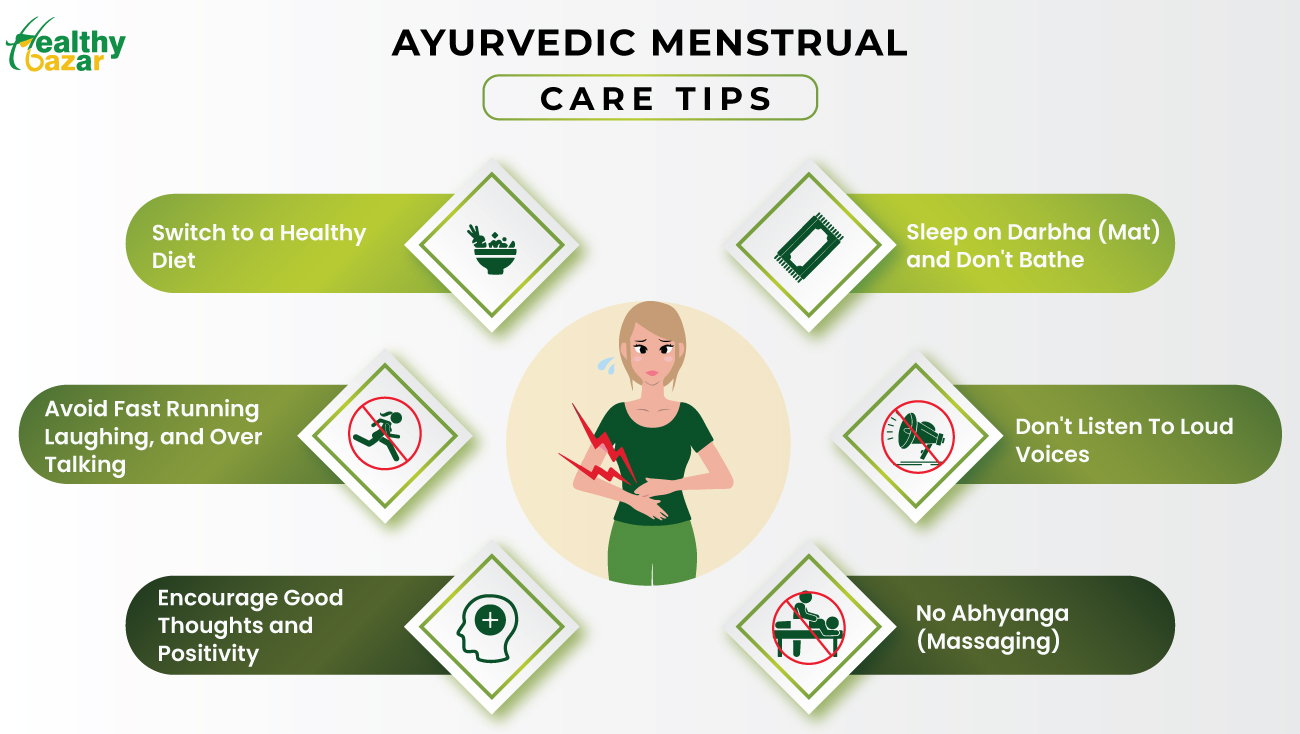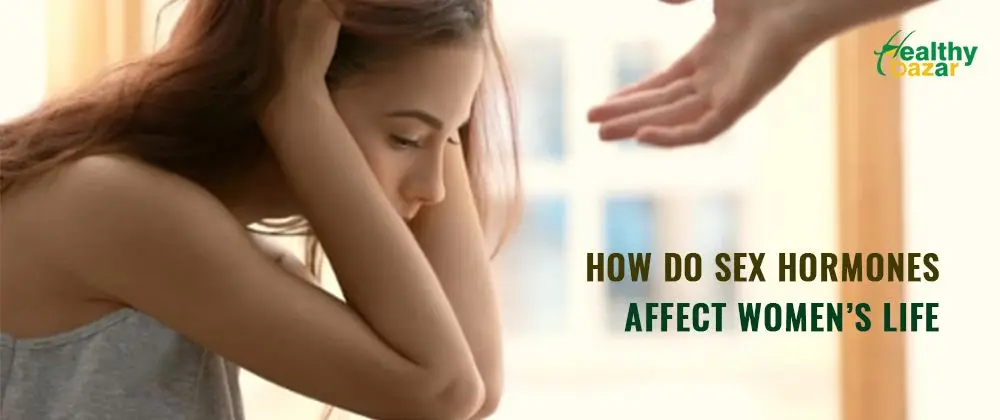 Where should we deliver your order?
Where should we deliver your order?Herbal Remedies for Irregular Menstrual Cycle

It is unfortunate that women barely talk about their problems during their periods. Discussing menstruation is considered taboo in our society; many girls are not even aware of menstruation until they start their period. Most of the time, they face anxiety and confusion while understanding the situation.
In the present era, most women are working. Along with their careers, they also have to manage family responsibilities. This has made the lives of women busier and hectic than before. This demanding lifestyle has made it complicated to pay attention to their health, and it has eventually disturbed the normal menstrual cycle causing severe disorders related to it.
The average length of a menstruation cycle is 28 days. If the cycle is shorter than 24 days or more than 38 days long, it may cause some complications. These complications lead to irregular periods.
It is a common gynaecological problem among women during their reproductive age. This menstrual disorder can also affect women's lives and sometimes leads to severe issues, for instance, Amenorrhea, Dysmenorrhea, Oligomenorrhea, PCOS, infertility, etc.
As per Ayurveda texts, women have to pass three phases throughout their life journey. These phases are Bala (Childhood), Rajaswala (Menstruation/Reproduction phase), and Vriddha (Old Age/Menopause). Rajaswala is the most extensive and crucial phase-out of these three as it is the fertile period.
Symptoms of Irregular Menstrual Cycle
Generally, the duration of a woman's menstrual cycle is 28 days, and the time of the menstruation period is 4 to 7 days. However, the menstruation cycle can also vary from 21 to 35 days.
The symptoms of the irregular menstrual cycle include:
- The menstruation cycle is less than 21 days or more than 35 days.
- Missing periods from 2-3 months or more in a row.
- Menstrual bleeding occurs in less than 2-3 days or more than 7 days.
- The menstrual cycle occurs with abdominal cramps, nausea, breathlessness, muscular pain, or vomiting.
- Bleeding or spotting happens after the completion of periods and sexual intercourse.
Causes of Irregular Menstrual Cycle
In menstrual disorders, age plays an essential factor. Girls who have started menstruating at a younger age are at high risk of developing Dysmenorrhea and Oligomenorrhea. In addition, adolescents may develop Amenorrhea before their ovulation cycle. According to a report, 14% to 25% of women have irregular menstrual cycles.
We divide the causes of irregular periods into two phases mentioned below:
Causes in Adolescents
- Mental Stress
In the competitive world, the stress of various examinations over young girls who just started menstruation causes irregularity of menses. This physical and mental stress also causes hormonal imbalances.
- Exercise
Involvement in excessive physical stress, and sports activities, causes an irregular menstrual cycle. It increases the risk of Amenorrhea or Oligomenorrhea.
- Weight loss
Eating disorders are common causes of Amenorrhea in adolescent girls. In this situation, extreme weight loss and reduced fat lead to hormonal changes that disturb the menstrual cycle.
- Bad food habits
Due to wrong food habits, for example, eating junk food, oily food, bakery products, and irregular mealtimes can cause obesity. In addition, it impacts the menstrual cycle, further driving PCOD and metabolic disorders.
Causes in Reproductive Age
In the reproductive age group, increased incidences of advanced diseases cause menstrual abnormalities that include PCOD, uterine fibroids, Adenomyosis, Endometriosis, pelvis infections, etc.
The factors affecting are:
- Wrong diet
- Overweight or weight loss
- Physical and mental stress develop menstrual disorders
- Increased or repeated use of hormonal pills

Ayurvedic Overview of Irregular Menstrual Cycle
In Ayurveda, menstruation is mentioned under the heading of "Artava" and a female having a menstrual period is called "Rajaswala Stree." Therefore, Artava in females is considered equivalent to Shukra (semen) in males.
Ayurveda encourages women to gain better health and quality of life with the help of some care therapies (Paricharyas) during different phases of life.
These Paricharyas include:
- Menstrual care (Rajaswala Paricharya),
- Antenatal care (Garbhini Paricharya) and
- Postnatal care (Sootika Paricharya).
The most neglected Paricharya is the Rajaswala Paricharya because of lack of knowledge and lifestyle issues.
Rajaswala Paricharya helps women respond healthily to the drastic physical and mental changes during the menstrual cycle. It helps relieve most of the issues associated with an irregular menstrual cycle.
These are the principles behind Rajaswala Paricharya and their application in today's lifestyle:
1. Switch to a Healthy Diet
The diet principles of Rajaswala Paricharya include appetizers (Deepan), digestants (Paachan), correcting the functions of Vata (Vatanulomana), and increasing digestive fire (Agni Deepan). You can apply these principles in your lifestyle by eating properly, avoiding oily or junk food, and having regular mealtimes. You also need to prevent pungent (Tikshna), spicy (Katu), and salty food, along with bakery products.
2. Avoid excessive exercise
This is to avoid the vitiation of Vata Dosha. You can apply this to your lifestyle to have pain-free periods.
3. Encourage good thoughts and positivity
This principle says that you need to avoid mental stress. So towards its application, you have to keep your mind calm and relaxed as much as possible to reduce stress.
4. Sleep on Mat (Darbha) and don't bathe
It leads to instigating good thoughts and maintaining hygiene. For example, you will get relief from backache and body ache if you sleep on a mat. Also, don't bathe during the menstrual periods because it slows down the body's metabolism. But never forget to follow basic hygiene routines and maintain the cleaning of genitalia.
5. Don't listen to loud voices
It helps to keep your mind calm by avoiding the vitiation of Vata Dosha. So, do not listen to loud voices during your periods.
6. No Massaging (Abhyanga)
It is contraindicated in low digestive fire (Agnimandya). Women's digestive fire is quite low during periods, and massaging reduces digestive fire to a severe level. So, you don't have to follow Abhyanga (massage) during your periods.

Do's and Don'ts
- Eat meals made up of ghee, salt, rice, milk, and yawaka (a meal made of barley and dairy).
- Do light Yoga Asanas, for instance Padmasana, Bhujangasana, Paschimotanassan, and Shalabhasana.
- Avoid sleeping during the daytime and sleep on a hard bed.
- The use of Swedan Karma (steaming), Vamana Karma (therapy to help a person vomit), and Nasya Karma (administration of drugs by nasal route) is contraindicated.
- Sexual intercourse is contraindicated.
- Do not apply any ointments on genitals.
Ayurvedic Medicines for Irregular Menstrual Cycle
The irregular menstruation cycle causes many health problems. Every disease has different treatments, herbs, and herbo-mineral formulations. Here, we have categorized the Ayurvedic medicines as per the various diseases that are caused due to irregular menstrual cycles. So, you can consider purchasing these Ayurvedic herbs online to regulate your periods.







- Dysmenorrhea
It is a condition of painful periods, severe abdominal cramps, bloating, nausea and vomiting.
Prefer these Ayurvedic medicines in this condition:
- Chandraprabha Vati – 2 tablets twice a day with warm water
- Pradrantak Rasa – 1/2 tsp once a day with warm water
- Mensta syrup – 2 tsp thrice a day
- Hypomenorrhea
This is the condition of light period flow (less than 80ml) or a shorter span of periods than usual (less than two days).
The following Ayurvedic medicines to treat Hypomenorrhea:
- Raja Pravartini Vati – 2 tablets twice a day with warm water
- Tankan bhasma – 1/2 tsp once a day with warm water
- Lohasava – 2 tsp twice a day
- Oligomenorrhea
In this condition, periods occur infrequently or more than 2-3 times a month.
These Ayurvedic medicines can treat this condition:
- Evecare – 2 tablets twice a day with plain water
- Pradrantak Rasa – 1/2 tsp once a day
- Dashmoolarishta – 2 tsp twice a day
- Amenorrhea
During this condition, a woman's period is said to have stopped for 90 days or more due to various reasons, for instance, pregnancy, breastfeeding, or menopause. If young women have not started menstruating by the age of 14 to 16 years, it is also considered Amenorrhea.
These Ayurvedic medicines are recommended to treat this situation:
- Raja Pravartini Vati – 2 tablets twice a day with warm water
- Pushyanug Churna – 1 tsp twice a day with warm milk
- Ashokarishta – 2 tbsp thrice a day

Also Read: Women's Health: Incredible Ayurvedic Herbs For Managing PCOD
Conclusion
According to Ayurveda, menstruation is a naturally occurring purification (Shodhana) that happens monthly. Hence, it is necessary to follow Pathya (to be followed) and Apathya (not to be followed) diet, healthy lifestyle, and medicines mentioned under the Rajaswala Paricharya. The aim is to avoid Vata and Kapha dosha's vitiation. It also helps prevent the formation of metabolic waste (Aama) and restores energy.
Thus, by following Rajaswala Paricharya, women respond healthily to the physiological and psychological changes by keeping a balance of Doshas, Agni, and Bala. Also, Rajaswala Paricharya is the best example of preventing diseases (Nidana Parivarjana Chikitsa). Moreover, following care therapies (Paricharyas) and medications can counter the Irregular Menstrual Cycle. Find lifestyle tips and Ayurvedic products at HealthyBazar. All the products on-site are genuine, and one can also consult Dr Shivani Nautiyal –and expert in male/female health and fertility issues.
This article is written/approved by:

Dr. Shivani Nautiyal
Dr. Shivani Nautiyal is a renowned Ayurvedic physician, Panchakarma therapies specialist, and detox expert who has made significant contributions to the field of natural holistic healing and wellness. With her profound knowledge, expertise, and compassionate approach, she has transformed the lives of countless individuals seeking holistic health solutions. She is a Panchakarma expert, which are ancient detoxification and rejuvenation techniques. She believes in the power of Ayurveda to restore balance and harmony to the body, mind, and spirit.

 Sexual wellness
Sexual wellnessHow Do Sex Hormones affect Women’s Life?
 Dr. Shivani NautiyalFeb 18, 2026
Dr. Shivani NautiyalFeb 18, 2026 Sexual wellness
Sexual wellnessHow does Birth Control Methods Affect Sex Drive and Sexual Desire
 Dr. Shivani NautiyalFeb 18, 2026
Dr. Shivani NautiyalFeb 18, 2026 Sexual wellness
Sexual wellness5 Natural And Ayurvedic Treatment For Vaginal Yeast Infection For Women
 Dr. Shivani NautiyalFeb 18, 2026
Dr. Shivani NautiyalFeb 18, 2026 Sexual wellness
Sexual wellnessHow Do Sex Hormones affect Women’s Life?
 Dr. Shivani NautiyalFeb 18, 2026
Dr. Shivani NautiyalFeb 18, 2026 Sexual wellness
Sexual wellnessHow does Birth Control Methods Affect Sex Drive and Sexual Desire
 Dr. Shivani NautiyalFeb 18, 2026
Dr. Shivani NautiyalFeb 18, 2026 Sexual wellness
Sexual wellness5 Natural And Ayurvedic Treatment For Vaginal Yeast Infection For Women
 Dr. Shivani NautiyalFeb 18, 2026
Dr. Shivani NautiyalFeb 18, 2026













 4
4





